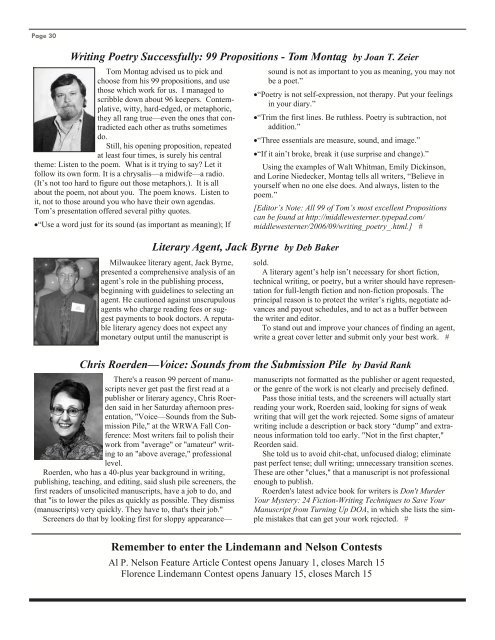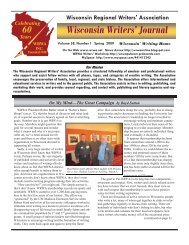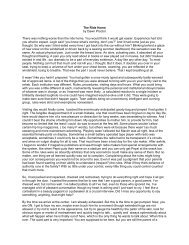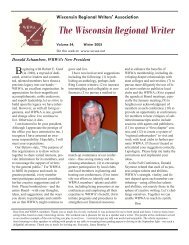WRWA Newsletter.pub - Wisconsin Writers Association
WRWA Newsletter.pub - Wisconsin Writers Association
WRWA Newsletter.pub - Wisconsin Writers Association
Create successful ePaper yourself
Turn your PDF publications into a flip-book with our unique Google optimized e-Paper software.
Page 30<br />
Writing Poetry Successfully: 99 Propositions - Tom Montag by Joan T. Zeier<br />
Tom Montag advised us to pick and<br />
choose from his 99 propositions, and use<br />
those which work for us. I managed to<br />
scribble down about 96 keepers. Contemplative,<br />
witty, hard-edged, or metaphoric,<br />
they all rang true—even the ones that contradicted<br />
each other as truths sometimes<br />
do.<br />
Still, his opening proposition, repeated<br />
at least four times, is surely his central<br />
theme: Listen to the poem. What is it trying to say Let it<br />
follow its own form. It is a chrysalis—a midwife—a radio.<br />
(It’s not too hard to figure out those metaphors.). It is all<br />
about the poem, not about you. The poem knows. Listen to<br />
it, not to those around you who have their own agendas.<br />
Tom’s presentation offered several pithy quotes.<br />
•“Use a word just for its sound (as important as meaning); If<br />
sound is not as important to you as meaning, you may not<br />
be a poet.”<br />
•“Poetry is not self-expression, not therapy. Put your feelings<br />
in your diary.”<br />
•“Trim the first lines. Be ruthless. Poetry is subtraction, not<br />
addition.”<br />
•“Three essentials are measure, sound, and image.”<br />
Literary Agent, Jack Byrne by Deb Baker<br />
Milwaukee literary agent, Jack Byrne,<br />
presented a comprehensive analysis of an<br />
agent’s role in the <strong>pub</strong>lishing process,<br />
beginning with guidelines to selecting an<br />
agent. He cautioned against unscrupulous<br />
agents who charge reading fees or suggest<br />
payments to book doctors. A reputable<br />
literary agency does not expect any<br />
monetary output until the manuscript is<br />
•“If it ain’t broke, break it (use surprise and change).”<br />
Using the examples of Walt Whitman, Emily Dickinson,<br />
and Lorine Niedecker, Montag tells all writers, “Believe in<br />
yourself when no one else does. And always, listen to the<br />
poem.”<br />
[Editor’s Note: All 99 of Tom’s most excellent Propositions<br />
can be found at http://middlewesterner.typepad.com/<br />
middlewesterner/2006/09/writing_poetry_.html.] #<br />
sold.<br />
A literary agent’s help isn’t necessary for short fiction,<br />
technical writing, or poetry, but a writer should have representation<br />
for full-length fiction and non-fiction proposals. The<br />
principal reason is to protect the writer’s rights, negotiate advances<br />
and payout schedules, and to act as a buffer between<br />
the writer and editor.<br />
To stand out and improve your chances of finding an agent,<br />
write a great cover letter and submit only your best work. #<br />
Chris Roerden—Voice: Sounds from the Submission Pile by David Rank<br />
There's a reason 99 percent of manuscripts<br />
never get past the first read at a<br />
<strong>pub</strong>lisher or literary agency, Chris Roerden<br />
said in her Saturday afternoon presentation,<br />
"Voice—Sounds from the Submission<br />
Pile," at the <strong>WRWA</strong> Fall Conference:<br />
Most writers fail to polish their<br />
work from "average" or "amateur" writing<br />
to an "above average," professional<br />
level.<br />
Roerden, who has a 40-plus year background in writing,<br />
<strong>pub</strong>lishing, teaching, and editing, said slush pile screeners, the<br />
first readers of unsolicited manuscripts, have a job to do, and<br />
that "is to lower the piles as quickly as possible. They dismiss<br />
(manuscripts) very quickly. They have to, that's their job."<br />
Screeners do that by looking first for sloppy appearance—<br />
manuscripts not formatted as the <strong>pub</strong>lisher or agent requested,<br />
or the genre of the work is not clearly and precisely defined.<br />
Pass those initial tests, and the screeners will actually start<br />
reading your work, Roerden said, looking for signs of weak<br />
writing that will get the work rejected. Some signs of amateur<br />
writing include a description or back story “dump” and extraneous<br />
information told too early. "Not in the first chapter,"<br />
Reorden said.<br />
She told us to avoid chit-chat, unfocused dialog; eliminate<br />
past perfect tense; dull writing; unnecessary transition scenes.<br />
These are other "clues," that a manuscript is not professional<br />
enough to <strong>pub</strong>lish.<br />
Roerden's latest advice book for writers is Don't Murder<br />
Your Mystery: 24 Fiction-Writing Techniques to Save Your<br />
Manuscript from Turning Up DOA, in which she lists the simple<br />
mistakes that can get your work rejected. #<br />
Remember to enter the Lindemann and Nelson Contests<br />
Al P. Nelson Feature Article Contest opens January 1, closes March 15<br />
Florence Lindemann Contest opens January 15, closes March 15






